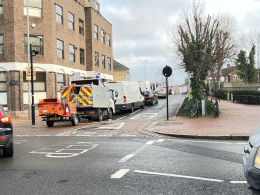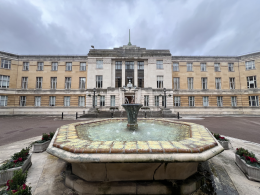The coffee and sandwiches laid out at St Margaret’s Church suggested a friendly community gathering. The atmosphere in the room told a different story.
By the time Council Leader Simon Hogg took the microphone on Saturday morning, every chair in the pretty church on Putney Park Lane was filled, with another five rows of residents standing at the back. Around 200 people had given up their Saturday morning, and it quickly became clear they hadn’t come for the refreshments.
“Can we just talk about the traffic?” someone called out before the formal proceedings even began. The council staffer moderating tried gently to suggest other topics might be discussed. The room wasn’t having it.
Misjudging the room
The setup had been carefully arranged – tables for local councillors, a station for MP Fleur Anderson, information about the council’s Access for All programme, and a map of Thamesfield and West Putney pinned to the wall with council transport officer Henry Cheung standing ready to answer technical questions. Outside, residents had been asked whether they minded being photographed, receiving different coloured stickers accordingly.
The PA system, set up using the altar as a stage, worked flawlessly. What didn’t work was the council’s initial pitch.
Hogg started by explaining Transport for London “which we might call TfL” as if addressing people unfamiliar with London’s transport bureaucracy. The room – packed with neighbourhood watch coordinators, residents’ association representatives, and people who’ve been following council issues for years – responded with a mixture of groans and barely suppressed eye-rolls.
“Read the room,” one woman muttered audibly.
Hogg calibrated quickly, but the damage was done. This was a crowd of professionals and engaged citizens who knew exactly how the system worked. They were frustrated precisely because they understood it so well.
The mood shifts
What began as buzzing conversation – people catching up, councillors circulating to ask what residents wanted to discuss – gradually hardened into something more focused. The demographics skewed older, roughly half the room between 60 and 80, with maybe a quarter in the 40-60 range and only a handful of younger faces. These were people with time to attend Saturday meetings and the institutional knowledge to ask informed questions.
When Hogg delivered his first set of talking points – the extra five seconds of green light time, the complexity of dealing with TfL, the need for patience – the response was immediate. Sighs. Groans. One or two people shouted from their seats, though others shushed them with sharp looks.
The security guard, who would later smile and say he was never concerned, straightened.
Defensive postures
Hogg had started the morning with a certain confidence, almost cocksure. But as question after question came back to the same theme – what are you actually going to do, and when? – his body language shifted. He looked genuinely shocked when his explanations were met with open disapproval.
“Why not?” someone shouted when he explained the junction couldn’t simply be reverted. “Just tell us why not!”
Anderson, more attuned to the community after years of constituency work, took a different tack. She focused on what she’d achieved – the bus task force, the meetings with TfL, her advocacy in Parliament. But neither she nor Hogg directly addressed what became the meeting’s central frustration: residents didn’t want to hear about more meetings. They wanted to hear about action.
“I work in the world of commerce,” Sean Pooley told them. “If someone had a critical problem in my business and it was then ten months later and you’re still listening to the problem, I would have been fired by now.”
The room erupted in agreement.
Politics doesn’t play
When Hogg attempted to shift some blame to “the previous administration,” noting that Councillor John Locker – who had just asked a question – “was a great proponent of this scheme,” the groans were audible and sustained. This was not a crowd interested in political point-scoring. They wanted their roads to work.
Both officials remained in defensive mode throughout, speaking clearly and trying to respond to each challenge, but never quite embracing what the room was telling them. They acknowledged problems but couldn’t promise solutions. They detailed process but couldn’t provide timelines. They asked for patience from people who felt they’d been patient for nearly a year.
A respected voice
When Gail Renard, head of the Bingham Road neighbourhood watch, took the microphone, the room settled into a different kind of attention. She didn’t shout. She didn’t need to.
“We have elderly people in tears because they can’t get a bus,” she said, her voice steady. She detailed walking over a mile every day to reach public transport, then asked what happens when winter comes, when it’s icy, when it snows. “What happens to the elderly and the disabled?”
Her testimony did something the officials’ explanations couldn’t – it brought the issue home. This wasn’t about traffic flow charts and TfL bureaucracy. This was about people’s daily lives, their ability to get to medical appointments, to maintain independence.
The room listened in near silence.
No laughs, no comfort
In another setting, Anderson might have lightened the mood – she’s good at finding moments of connection with constituents. On Saturday, she managed exactly one laugh from the crowd.
Toward the end, as Hogg launched into what appeared to be a prepared stump speech about all the council’s achievements – from vegetable oil-powered bin lorries to Dolly Parton book schemes – a kind of exhausted patience settled over the room. He was, several people remarked afterwards, boring them into submission.
It didn’t work. When the formal session ended and residents were invited to stay for individual conversations with councillors, the mood wasn’t relief but renewed determination.
What happens next
The meeting that was supposed to demonstrate the council was listening instead demonstrated the limits of listening without acting. Residents left not reassured but energised – and not in the way the council might have hoped.
“We need to think about what to do next,” one resident said, collecting their coat. “Because this clearly isn’t working.”
Several people discussed petitions, writing campaigns, attending the transport committee meeting in November, staging a protest and bringing Putney Bridge to a halt. More than one person mentioned the May elections. The vote was coming, and Putney’s traffic would be on the ballot.
The security guard confirmed what anyone in the room could have told you: it never got out of hand. But it also never got comfortable. For 90 minutes, Putney’s elected representatives faced their constituents’ frustration directly.

A strange confrontation
After nearly everyone had left, Hogg walked out of the church onto Putney Park Lane. This publication’s editor, having attempted to catch him several times inside, called out: “Simon – do you have a minute?”
“No, I don’t,” he replied, continuing to walk.
We followed, asking periodically whether he really intended to keep walking rather than answer a few questions about how he felt the meeting had gone. Hogg didn’t respond. He reached his car, got in, and started the engine.
We were stood behind the vehicle. Hogg reversed. We stepped aside. When Hogg attempted to drive forward, we stood in front of the car, asking him not to be silly and to just have a quick conversation.
Hogg said something from inside the car, but with the windows up, it was inaudible. “Can’t hear you?” we called out.
Hogg paused, then reversed down a long narrow road to avoid the conversation.
For a man who had spent 90 minutes inside the church promising to listen, who had apologised for poor communication and committed to doing better, who had told residents “we only know what’s going on if you tell us” – it was a curious end to the morning.
The leader of the council, when faced with a few questions from the local press, chose to drive away rather than talk.
Additional reporting: The meeting began at 11am and ran until approximately 12:30pm. Council transport officers remained available afterwards for individual consultations. The church, on Putney Park Lane, proved an apt venue – beautiful but austere, with excellent acoustics for carrying both official statements and the groans that met them.







Many thanks for these articles, really helpful and insightful. I wanted to attend but couldn’t. The whole situation is a disgrace. Hogg’s attitude at the end says it all. They have stuffed this up royally. The ultimate answer is for Hogg to go; there must be accountability and it’s clear he will not lose face by undoing the mess he has presided over and created.